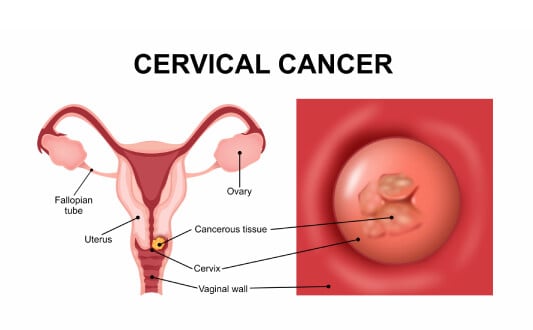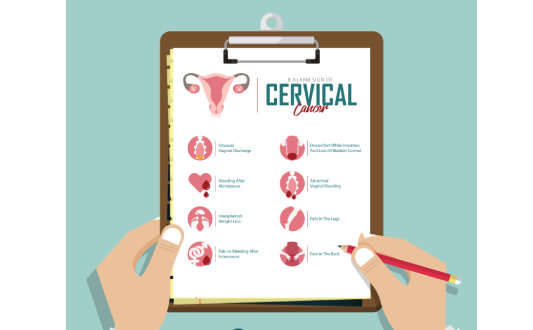Cervical cancer is widespread, but one of the most treatable oncologic conditions, especially in early diagnosis. Right after detection of the disease all efforts are made to establish its stage and elaborate the most beneficial treatment plan. If a woman wants to have child in future, doctors always take this into consideration, as different treatment methods affect reproductive potential in a different way.
Beyond all doubt, total cure, stable remission and decent life expectancy are of the primary importance, but up-to-date techniques give more chances to preserve childbearing ability in young women. In addition, doctors pay attention not only to sole life expectancy, but to proper quality of the future patient`s life, as well. It is absolutely possible to fight the disease and return back to the normal life, and your doctor will always help you with this.
From stage 2B, the treatment of cervical cancer is carried out without surgery. The tumor is considered inoperable and can only be treated with chemotherapy and radiation therapy.
Content
- Leading clinics of Germany and cervical cancer treatment costs
- What is the prognosis for cervical cancer and how is it made?
- What are the survival rates for cervical cancer and what influences them?
- Is it possible to save reproductive function in cervical cancer?
- Will I live full life without any limitations after cervical cancer treatment?
- What if I need additional support during or after cervical cancer treatment?
- Is it possible to improve my prognosis in cervical cancer?
Leading clinics of Germany and cervical cancer treatment costs
Thanks to the modern equipment and highly qualified doctors, the leading positions in the diagnostics of cervical cancer and its comprehensive treatment are held by the following clinics:
- University Hospital Rechts der Isar Munich, department of Gynecology, Mammology, Obstetrics and Perinatal Medicine.
- University Hospital Tuebingen, department of Adult and Pediatric Gynecology, Mammology, Obstetrics.
- Memorial Sisli Hospital Istanbul, Department of Gynecology, Gynecologic Oncology, Urogynecology and Obstetrics
- Medicana International Istanbul Hospital, In Vitro Fertilization Center
- University Hospital Ulm, department of Obstetrics, Adult and Pediatric Gynecology.
The cost of the medical program depends on the required preliminary examination and treatment tactics. Average prices for diagnostics and treatment are listed below:
- Diagnostics of сervical cancer – 4,400 €
- Conization and removal of affected tissues – 8,500 €
- Extensive surgical resection – 26,600 €
- Chemotherapy and radiotherapy for cervical cancer – 32,400 €
What is the prognosis for cervical cancer and how is it made?
So, let’s start from the very beginning and clarify what does the term “prognosis” mean. In general, “prognosis” is a chance or probability to reach certain treatment aim or other important for you aspect (e.g. absence of disease recurrence, ability to work in the certain sphere, chance to restore usual physical activity, etc.). Prognosis shows likely outcomes of treatment, based on the data obtained from thousands of other people with the same condition. Main specialized large healthcare institutions (like The Institute of Cancer Research, London and National Cancer Institute (NCI) of the USA) collect comprehensive statistical information in order to estimate effectiveness of diverse treatment options, possible risks and complications of treatment, necessity to go through the rehabilitation after the treatment completion, etc. It should be mentioned that we talk now about just statistical data, without mentioning names or other personal information. Personal data of the patients is confidential and strictly protected by the law.
Immediately after establishing the diagnosis you may be a little bit confused and want to discuss your prognosis with the doctor in order to clarify the picture of your future. Or, vise versa, you may find statistical data useless and frightening and proceed to discussing treatment options. Anyway, it is better to understand specifics of creating the prognosis regarding life expectancy and reproductive potential and be able to make your decision consciously.
So, what statistics really offers you and what you should always take into consideration:
- As it was mentioned before, the statistical data is obtained from large groups of people. Thus, it provides the mean information about prognosis and risks. Your doctor can`t predict your future for sure based on it, as everything is highly individual.
- The statistical data is specific for cancer types and stages, age groups, ethnicity, concomitant conditions, etc. So, your doctor needs to find one, which is the most close to your particular situation. More common aspects are found, better the quality of the result is.
- Statistical data are created, first of all, for healthcare providers, not for the patients. Naturally, certain data may seem unclear and useless. You should feel free to ask your doctor about any cancer-related information and he will explain you everything in simple words.
- Statistical data on survival rates gives your doctor important information when it comes to choosing the most appropriate treatment option. The same is for the reproductive potential. However, the statistical prognosis should be only one of numerous factors, influencing elaboration of the treatment plan. Basing the decision only on the statistics is inappropriate.
- When we talk about the prognosis for life, doctors usually look at five-year survival rates. This is quite good and informative, but includes five-year-old treatment options, whereas treatment schemes in cervical cancer are updated annually. This means that more up-to-date and effective options are already available and will provide better results.
So, if you want to know more about your disease, you should take a look at the statistics and prognosis for your diagnosis. The same time it is better to remember that the prognosis – is not something that will happen for sure. Efforts of your treating physician and your personal active involvement are more important for reaching excellent final result.
What are the survival rates for cervical cancer and what influences them?
When we want to find information about life expectancy in cervical cancer, the statistics usually offers us the data on five-year survival rate. Such period of time (five years) is standard for many cancer types, as it allows to estimate effectiveness of treatment, absence of the disease relapses and complications. “Five-year survival rate” reflects percent of women, who live for five years and more after establishing the diagnosis. In general, during last decades sickness rate for cervical cancer has become significantly higher due to regular screening tests. Simultaneously, survival rates have improved for the same reason.
Beyond all doubt, life expectancy in patients with cervical cancer is strictly individual, but there are certain common decisive factors:
- Stage of cervical cancer at the moment of establishing the diagnosis. Naturally, earlier the treatment is started, better result is obtained. For example, survival rate in women with pre-cancer (stage 0 or carcinoma in situ) is close to 100%. Unfortunately, cancer doesn`t cause any symptoms at this stage, so it can be revealed only during check-up. We will mention concrete statistical data on life expectancy according to the stage of cervical cancer further.
- Tumor type and its aggressiveness. Spreading of oncological process to the nearby tissues and organs, lymphatic system or remote organs (metastasizing) significantly influences the prognosis. We see better prognosis when the tumor is local and affects nothing but the cervix itself. The most common type is keratinizing or non-keratinizing squamous cell cervical cancer, as well as adenocarcinoma is less common. The treatment of squamous cell carcinoma of the cervix is characterized by favorable prognosis.
- Individual sensitivity and response to therapy. There are no two completely identical women – each drug for the chemotherapy will cause similar, but not identical effect. The same is about surgical interventions – they will be alike, but each will have peculiarities and lead to slightly different results.
- General state of health and presence of the concomitant conditions. Good general well-being helps in withstanding surgical treatment (which may be extensive at advanced stages of cervical cancer), radiation therapy and chemotherapy with their side effects.
- Non-modifiable factors: ethnicity and age. White women have somewhat better five-year survival rate than black women do (69% against 56%). Also survival is better in women under 40 years old, gradually lowering with age.
However, stage of the cervical cancer at the moment of establishing the diagnosis is the most significant factor, which determines survival rate.
General statistics is the following:
- The five-year survival rate at stage 0 reaches 100%
- At stage IA the five-year survival rate is about 93%; at stage IB it is about 80%; it depends on the substage, which is determined by the depth of penetration of invasive cervical cancer into healthy tissues
- At stage IIA the five-year survival rate is about 63%; at stage IIB it decreases to 58%
- At stage IIIA the five-year survival rate is about 35%; at stage IIIB it is about 32%
- Stage IVA has a five-year survival rate of about 16% and stage IVB – about 15%
The risk of complications and symptoms of cervical cancer can be reduced by the qualified surgical treatment.
Survival rate is just a general information about women with the same condition, it can`t predict your future. What this prognosis does for sure – it indicates importance of regular gynecological check-ups for preserving your health.
Is it possible to save reproductive function in cervical cancer?
When cervical cancer is revealed in young women it becomes important to stop oncological process and preserve fertility at the same time. This mainly depends on two factors – how advanced the cervical cancer is and what kind of treatment is planned.
Based on this, few options of saving childbearing potential are possible:
- Saving the whole reproductive system (uterus with its cervix, ovaries)
- Removing cervix and saving uterus and ovaries
- Removing uterus and saving ovaries with eggs
The first variant is possible at early stages of the disease, when the tumor is superficial (this variant is called “carcinoma in situ”). In this case pathologically changed cell can be destroyed by means of cryosurgery or laser surgery. These are outpatient interventions that don`t damage cervix of the uterus and don`t influence ability to have a child in the future. Conization of the cervix is somewhat more traumatic intervention, which includes removing a cone-shaped piece of tissue with oncological cells. Conization is performed with the help of cold knife or Loop Electrosurgical Excision Procedure or Large Loops Excision of the Transformation Zone (LEEP or LEETZ procedure). Despite losing certain volume of tissue, cervix still fulfills its function and physiological pregnancy is possible.
The second variant is possible when the tumor reaches only the inner part of the cervix, without spreading to nearby organs or further, via lymphatic system. In this situation age of a woman and her wish to have children in the future are considered. In case there is no need to save reproductive function, total or radical hysterectomy is performed. Otherwise, if the hospital is equipped in a proper way, it is possible to choose radical trachelectomy. Radical trachelectomy implies removing cervix, nearby tissues and upper part of the vagina. Sometimes this procedure may be performed even in affection of nearby lymphatic nodes, as all tissue around the cervix is removed anyway. As a result, the uterus stays undamaged, so a woman can get pregnant and carry pregnancy to a term. In should be noted, that natural childbirth is impossible after such surgery and a baby is delivered by caesarean section.
When uterus and nearby organs are involved in the oncological process it is still possible to save ovaries – source of eggs. Naturally, after removing the uterus a woman is not able to carry pregnancy by herself, but preserved eggs can be used for the surrogacy programs. Surrogate mother will carry a child conceived from this egg and patient`s partner`s sperm. In addition, working ovaries improve woman`s quality of life, because they continue producing hormones. Sometimes it is even possible to remove ovaries from their typical location and place in the abdomen or even in the forearm. This is helpful in preserving eggs for in vitro fertilization, as well.
When cervical cancer is advanced treatment is not limited to performing a surgical intervention. To make the cure more stable surgery is accompanied by chemotherapy or radiation therapy. Unfortunately, both of these methods damage woman`s eggs, so it is totally impossible to have own child in the future. Adoption is a good decision for such women. There are many children in seek of family and love, giving new home to one of them will be a right step.
Will I live full life without any limitations after cervical cancer treatment?
Many women with cervical cancer prefer better quality of life to longer life expectancy. Indeed, prognosis for life should take into consideration not only the number of years and months, but also ability to live happily and be satisfied with own well-being. Similar to general prognosis for life, quality of life is closely connected with stage of cervical cancer, involvement of other organs in the process and method of treatment.
It should be mentioned that despite possible side effects of the treatment (e.g. surgical removing of certain organs and tissues, chemotherapy, radiation therapy) it always improves both life expectancy and quality of life. For example, treatment improves sexual life, as it stops abnormal vaginal bleedings, pathological vaginal discharge and relieves discomfort or pain during the sexual intercourse. Other aspect is reducing symptoms of general intoxication, which are present in all types of advanced cancer, not only in cervical cancer.
The most important aspects, which women usually want to discuss with their treating gynecologist or general practitioner after receiving information on the prognosis for life, are the following:
- Work and daily activities. Cervical cancer doesn`t cause any limitations to any kind of professional occupations, practical activities, driving, etc. You will only need to avoid heavy housework, long drives and lifting heavy things during the recovery period after the surgery, which may last up to 12 weeks in complicated cases.
- Sexual contacts, contraception or early menopause. As it has been already mentioned, treated cervical cancer is not a contraindication to having sexual intercourse. You will also wait for few weeks after the surgery is performed, but nothing more. In case you ovaries are preserved, but you have gone through radiation therapy or chemotherapy, you will need to take reliable contraception measures, as eggs are damaged in these types of treatment. In case your ovaries are removed, you will no longer have period and develop early menopause.
- Visual changes. You will look the same, as you were before the start of treatment. No one will ever know about your diagnosis unless you tell him this.
- Follow-up examination. Beyond all doubt, you will go through careful examination after the treatment (more frequent) and afterwards (once per 6 or 12 months). In case your doctor has chosen the tactics of “watchful waiting” instead of active treatment, you`ll have monthly check-ups or even see a doctor more often.
In case you have certain worrying aspects and want to improve them, you can always go through the rehabilitation – the oncological or gynecological one. Visiting a health resort is helpful for both physical and mental well-being. You may need some time to think about your disease and future plans, so you will have an opportunity to do this in a calm atmosphere.
What if I need additional support during or after cervical cancer treatment?
Without doubt, prognosis for life and reproductive function depends primarily on physical factors – stage of cervical cancer, treatment scheme, individual response for the treatment, etc. Nevertheless, emotional sphere and psychological state influence both life expectancy and reproductive potential, as well. It is extremely important to accept your diagnosis (not trying to pretend that you don`t have cancer or don`t care about it), get actively involved into treatment, communicate with your treating physician and make plans for the future.
In case you still have worries regarding the diagnosis or consequences of treatment, or feel anxious, depressed, resentful or angry, you can always share your thoughts and emotions. First, you can speak with family members and close friends. These people know you well, take care of you and provide all necessary support. Sometimes relatives and friends don`t offer you help themselves in order not to hurt your feelings with sympathy, so you should feel free to start this conversation first.
Some women don`t want to involve close people into discussion of the disease or just wish to have a consultation of a more professional in this area person. In this case you can appeal to psychologist or psychotherapist, especially a specialized in patients with oncology ones. Otherwise you can attend support groups where women with the cervical cancer gather to share their experience. Sometimes helping someone else will give you more than the best professional advice can. Such groups are usually available in corresponding healthcare institutions, also there are more global ones, like online communities.
If you want to contribute to elaboration of new effective treatment options for cervical cancer, you can take part in a clinical trial. Research in this sphere is ongoing, so you may ask your physician about suitable for you options and apply for the participation. In addition, this is a good chance to try new treatment scheme or technique, not available in wide clinical practice yet.
Is it possible to improve my prognosis in cervical cancer?
It is obvious that early detection of the disease is a key to improving prognosis regarding life and childbearing ability. The problem is there are no distinct clinical signs of early cervical cancer. Regular check-up will help in assessing the state of your health and taking necessary measures.
Good quality prophylactic examination requires the following:
- Up-to-date technical equipment
- Qualified healthcare professionals, who are able to notice the slightest changes of the cervix
- Ability to provide treatment immediately, if necessary, don`t letting the disease to advance
- Availability of the whole spectrum of treatment options – this is important for performing minimally invasive surgeries, improving the prognosis regarding life and reproductive function
Taking into consideration all these factors, many patients take the decision about examination and treatment abroad, in countries with more advanced medical sphere. When it concerns cervical cancer treatment and improving the prognosis regarding life and reproductive potential, it is worth thinking about Germany. German medicine guarantees highly individual approach to elaboration of the treatment scheme, availability of all necessary technical devices, excellent qualification of surgeons and appropriate rehabilitation. In addition, Germany provides medical services for the international patients, which is important, as well.
Cost of cervical cancer treatment in different countries:
| Price | |
|---|---|
| Germany | from 8,500 EUR |
| Israel | from 9,800 EUR |
| Turkey | from 6,770 EUR |
When planning treatment for cervical cancer in Germany, services of company Booking Health will be really helpful in order to avoid organizational difficulties. Aim of our work is to assist foreign patients in receiving medical help, and we are officially authorized by clinics for this.
Booking Health company will give you a helping hand and:
- Recommend the best doctor and clinic for your case
- Book an appointment on the convenient date
- Organize comprehensive medical program, including check-up, all kinds of treatment and rehabilitation
- Provide you with transfer, interpreter and medical coordinator
- Provide you with medical insurance
- Prepare for you all the medical reports and further recommendations in your native language
- Help you in further communication with your treating physician during follow-up period, if necessary
To start planning your treatment you can leave the request on the web-site of Booking Health company. You will be contacted by our patient case manager the same day to discuss all the details. We will be glad to help you in fighting cervical cancer, having long and full life, and becoming a parent once the treatment is over.
Choose treatment abroad and you will for sure get the best results!
Authors:
This article was edited by medical experts, board-certified doctors Dr. Nadezhda Ivanisova, and Dr. Bohdan Mykhalniuk. For the treatment of the conditions referred to in the article, you must consult a doctor; the information in the article is not intended for self-medication!
Our editorial policy, which details our commitment to accuracy and transparency, is available here. Click this link to review our policies.
Sources:
Read:
Treatment of stage 4 cervical cancer in Germany
Don't know where to start?
Contact Booking Health







